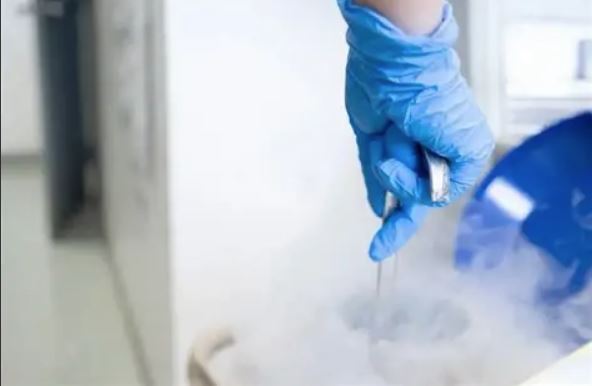Egg freezing, or oocyte cryopreservation, is a fertility preservation method where a woman’s eggs are collected, frozen, and stored for future use. It is particularly beneficial for women wishing to delay pregnancy for personal, medical, or social reasons. With modern vitrification (ultra-rapid freezing), egg survival rates have greatly improved. Eggs are stored in liquid nitrogen at −196°C for up to five years in the UAE, with annual renewals and the option to extend storage for another five years. Women may consider egg freezing for personal reasons such as delaying childbearing for career, education, or relationship goals, or for medical reasons including upcoming chemotherapy or radiotherapy, autoimmune conditions like lupus or rheumatoid arthritis, or a family history of early menopause.
The process begins with a consultation and diagnostics to review medical history and assess ovarian reserve through an AMH blood test and antral follicle count. Ovarian stimulation follows, using hormonal medications for 10–14 days to grow multiple follicles, with progress monitored by blood tests and ultrasounds. Egg retrieval is performed under sedation, using a thin needle to aspirate mature follicles. Only mature eggs (Metaphase II) are frozen using vitrification. For future use, eggs are thawed and fertilised via ICSI, with embryos transferred in either fresh or frozen cycles.
ESHRE and ASRM guidelines suggest aiming for 15–20 mature eggs if under 35, 20–25 for ages 35–37, and 25–30 for ages 38–40, while noting that success is significantly lower over 40. Success depends on age at freezing, the number of mature eggs retrieved, and sperm quality at use. Around 75% of collected eggs are suitable for freezing, 70–80% survive thawing, and 60–70% fertilise. Live birth rates are highest for eggs frozen before 35, with cohort studies showing improved outcomes when more mature eggs are banked earlier. However, only about 4% of women return to use their frozen eggs, which limits long-term success data.
Potential risks include ovarian hyperstimulation syndrome (rare but possible during stimulation), egg loss during thawing, incomplete fertilisation, and the emotional or financial investment with uncertain results. At Almond Blossoms, we recommend early planning—ideally before 35—alongside informed decision-making, realistic expectations, and annual reviews of storage and plans. Egg freezing is a powerful option for preserving fertility but is not a guarantee, and we encourage every woman to seek personalised advice with one of our fertility specialists.

Sed ut perspiciatis unde omnis iste natus error sit voluptatem
Book a private session with our fertility experts or psychologists. We’ll listen, understand your needs, and help you take the first step toward care that’s truly tailored to you.
We offer advanced fertility and psychological assessments to better understand your reproductive or emotional health- laying the groundwork for a plan that fits you.
Based on your needs, we design a plan that’s medically sound, emotionally supportive, and completely customized- whether you’re pursuing treatment, therapy, or both.
With expert care and a compassionate team by your side, you’ll begin a journey that supports your body, your mind, and your future- every step of the way.
Our assisted reproduction services offer advanced fertility solutions like IVF and IUI, tailored to your unique needs. With expert care and cutting-edge technology, we help you take confident steps toward parenthood.



